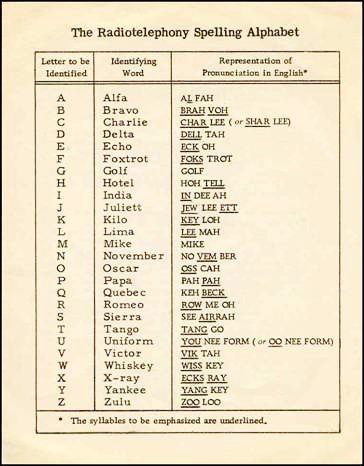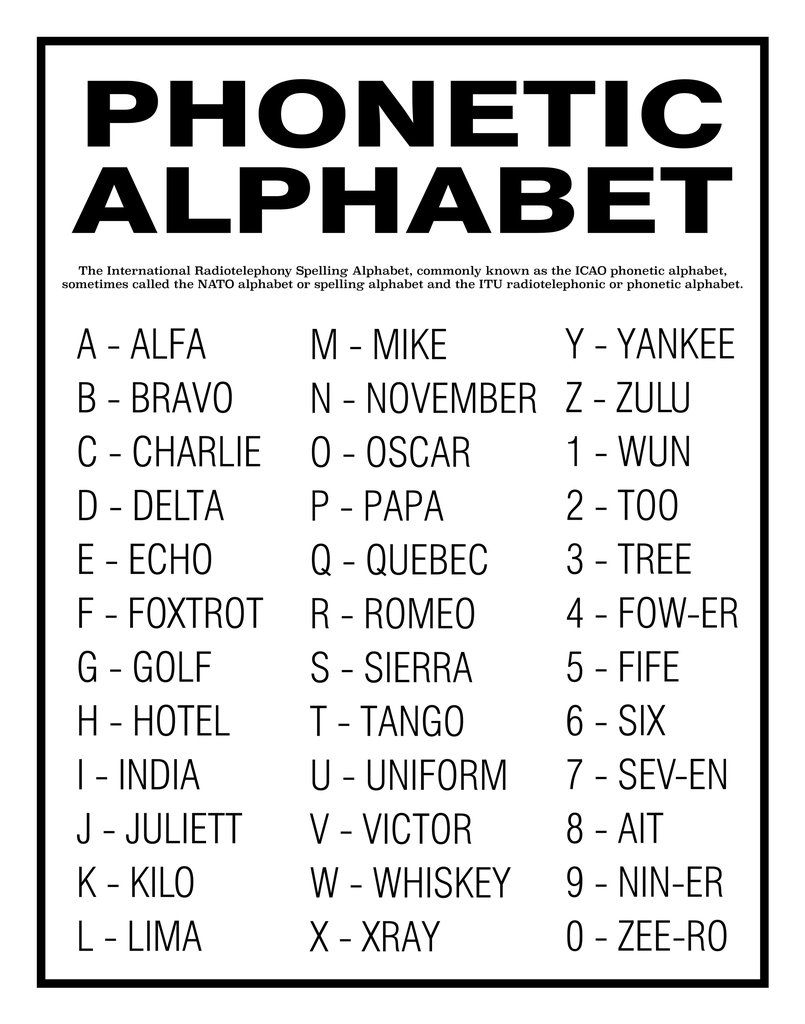
The APCO radiotelephony spelling alphabet and its variations represent the letters of the English alphabet using words as follows: law enforcement radiotelephony spelling alphabets ĪPCO's Project 14 updated the definition of Ten-codes, and also adopted the international radiotelephony spelling alphabet for use by law enforcement nationwide.Ĭomparison of U.S.
THE RADIOTELEPHONY SPELLING ALPHABET LICENSE
For example, the license plate "8QXG518" might be read by a civilian as "eight cue ex gee five eighteen" but with accuracy being paramount, the police dispatcher would say "eight queen x-ray george five one eight." Despite the development in 1941 of the Joint Army/Navy Phonetic Alphabet and its replacement, circa 1956, by the NATO phonetic alphabet (currently used by all NATO armed forces, civil aviation, telecommunications, and some law enforcement agencies), the LAPD and other law enforcement and emergency service agencies throughout the United States continue to use their traditional system. Saint Paul, Minnesota Police DepartmentĪt some point in the early history of emergency service mobile radio systems, the LAPD adopted the APCO radio spelling alphabet for relaying precise information on individual letters.A partial list of police departments using the modern APCO/ICAO spelling alphabet includes: However, most police departments nationwide have kept using the 1940 APCO spelling alphabet, with those using the 1974 APCO spelling alphabet being the exception, rather than the rule. In 1974, APCO adopted the ICAO International Radiotelephony Spelling Alphabet, replacing the Adam-Boy-Charlie alphabet APCO first published in 1940. Replacement with international spelling alphabet The resulting final list differs from the Bell Telephone word list by only five words, and from the Western Union word list by only eight words.

Lists used by military services were excluded because of a lack of permission to reproduce.
THE RADIOTELEPHONY SPELLING ALPHABET PLUS
The questionnaire solicited suggestions, but also included the existing Western Union and Bell Telephone word lists, plus another list then in general use by a number of police stations. The list was based on the results of questionnaires sent out by the Procedures Committee to all zone and interzone police radio stations. By this point, APCO President Herb Wareing "came out in favor of a standard list of words for alphabet letters, preferably suitable for both radiophone and radiotelegraph use." The APCO first suggested that its Procedure and Signals Committee work out a system for a "standard set of words representing the alphabet should be used by all stations" in its April 1940 newsletter. In 1974, APCO adopted the ICAO Radiotelephony Spelling Alphabet, making the APCO alphabet officially obsolete however, it is still widely used, and relatively few police departments in the U.S. Despite often being called a "phonetic alphabet", it is not a phonetic alphabet for transcribing phonetics.

It is the "over the air" communication used for properly understanding a broadcast of letters in the form of easily understood words. LAPD radio alphabet, is the term for an old competing spelling alphabet to the ICAO radiotelephony alphabet, defined by the Association of Public-Safety Communications Officials-International from 1941 to 1974, that is used by the Los Angeles Police Department (LAPD) and other local and state law enforcement agencies across the state of California and elsewhere in the United States.


Old word list for law enforcement agencies


 0 kommentar(er)
0 kommentar(er)
